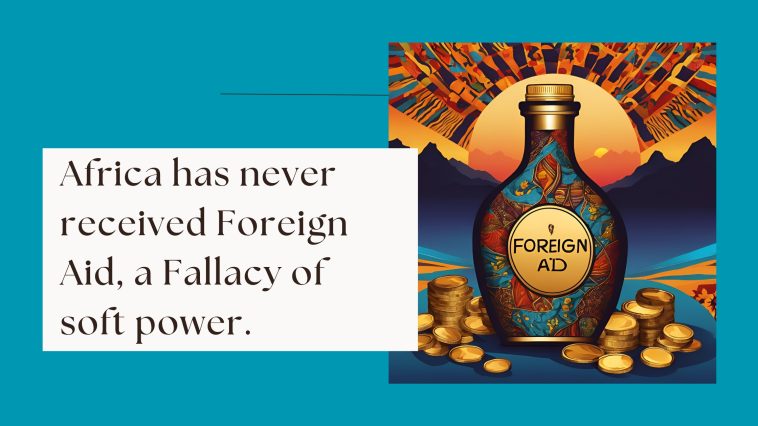There has been a heated controversy surrounding aid on the continent fueled by a Trump executive order. The saddest part is that African elites cannot grasp the myth of Aid and Africa’s Economic Reality. Foreign aid has long been employed as a lifeblood for the Third World countries in Africa and depicted as the white knight of medicine, education, and agriculture. That’s is the scripted truth that we were conditioned to buy into by the western education. At face value, the reality of the effect of aid contains a far different and more malicious story.
The recent proposal to phase out USAID by Elon Musk’s Government Efficiency (DOGE) bureau and bring it under the Statement Department will impact one of the most prominent aid avenues in Africa. It will certainly emphasize the weak status of the system. In Uganda, for instance, USAID-funded programs sustain over 1.2 million HIV/AIDS lives on treatment through PEPFAR and support rural farmers with farm inputs through Feed the Future project. Such a withdrawal of aid would, however, trigger an immediate public health crisis, agricultural collapse, and loss of education opportunities. In spite of the evident impacts of foreign aid, the truth is that Africa has never really “received” aid as most people know it. Rather, the continent has become part of a network of economic measures and financial processes that allow much more money to escape Africa than stay there.
This criticism seeks to dispel the popular myth that Africa is dependent on aid, and argues that the global financial system has instead caused a “silent hemorrhage” of African capital, much greater than the sums diverted into aid programs. The Illusion of Aid and Its Political Motivation Most Africans, particularly on social media, have embraced the notion of an end to aid. In other cases, this euphoria is reminiscent of the sentiment articulated by economist Dambisa Moyo in her Dead Aid thesis, which condemns aid for inducing dependency and propping up corrupt regimes.
While there is some truth to these claims, the euphoria overlooks a more fundamental issue, the aid system, though imperfect, is not the source of the problem. Instead, the actual issue is the international system that internationally extracts wealth from African nations in a systemic way, leaving the continent perpetually disadvantaged. The argument regarding the cut-off of aid does not consider the fact that the actual financial bleeding of Africa is brought about by external actors who benefit from exploitative economic relations and financial schemes. This inequality is not an effect of aid dependency, but a product of a system existing to maintain Africa’s economic subordination.
To comprehend the scale of financial hemorrhage, we need to look at the Net Financial Outflows NFO and Illicit Financial Flows (IFFs), to deeply see how Africa pays more than It receives. Net Financial Outflows refer to the situation where the money leaving a country exceeds the money coming in. The bitter reality of African economies is that while $1 arrives in the form of aid, $4 leaves the continent. This is through channels like debt repayments. African nations are required to service a $35 billion annual debt, much of which has been taken on the basis of white-elephant projects that accrue more benefits to foreign firms than to the local people.
Then we have the aspect of repatriation of profits made by foreign firms. For example Glencore and Shell companies exploit Africa’s vast natural resources but enjoy profit remitted within no time to foreign bank accounts. As much as 60% of Africa’s mineral riches are lost to overseas channels, estimates a 2023 UNCTAD report.
Then there are the illegal movements of money out of a country that know as Illicit Financial Flows (IFFs). This adds fuel to the fire. On top of the legal flows, Africa loses even up to $89 billion annually in estimated illicit financial flows, that including tax evasion that see foreign firms constantly avoid paying taxes by utilizing shell companies and misinvoicing of trade. For example, Uganda lost $527 million in 2020 from these activities, roughly twice its health budget. Resource extraction manipulation, DR Congo gold, are misrepresented, resulting in enormous losses. Nigeria lost $18 billion between 2010-2018 through IFFs, which would be enough to finance 24,000 primary schools.
The African continent still has to deal with exploitative resource-backed loans. Let’s take and example of Angola and Congo-Brazzaville that have been ensnared by oil resource-based loans. When periods of declining oil prices come up these countries are faced with the option of either settling debts or catering to the basic needs of their people, such as financing crucial public services such as schools and healthcare.
Africa’s economic subordination has its roots in an inheritance of historical injustice. The exploitation of the continent started with the Berlin Conference (1884), which created extractive colonies in Africa and laid the foundation for centuries of plundering of resources. Belgium’s King Leopold II, for instance, drained an estimated $1.1 billion (in adjusted terms) from the Congo Free State in rubber and ivory, a process that claimed millions of lives.
The colonial heritage was buttressed by policies like the 1980s and 90s Structural Adjustment Programs, which compelled African nations to privatize basic services like water and healthcare, deepening poverty and creating a cycle of dependency. The past wrongs that included slavery, colonialism, and the Cold War constructed the current economic order, and the resulting aid systems are not charity, but a form of circumscribed restitution.
Aid, from this point of view, is not just a moral imperative, but a step toward justice and not a patronizing handout, but also a strategic investment in common interests. The solution should be an African-led development and global accountability. We could even use blockchain technology to meet the end.
The cessation of foreign aid, while devastating in the short term, presents an opportunity to rethink the system and its long-term implications. Stopping aid without addressing the underlying structures of economic extraction and exploitation will only perpetuate the cycle of poverty and inequality. Africa’s true path to prosperity lies in the reclamation of its wealth through reparations, fair trade, and global accountability. As Kenyan activist Njoki Njehu puts it, “We’re not begging. We’re asking back.” The time has come for the global community to either continue its silent theft or finally make amends. The choice is ours, and it’s a matter of justice.
Sources:
– Global Financial Integrity (2021), “Illicit Financial Flows to and from Developing Countries”
– UNCTAD (2023), “Economic Development in Africa Report”
– UNAIDS (2023), Uganda Country Profile
– “Dead Aid” by Dambisa Moyo (2009)
– “Britain’s Black Debt” by Hilary Beckles (2013)
This post was created with our nice and easy submission form. Create your post!






